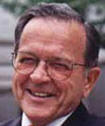Senate Commerce Committee Passes Media
Ownership Bill
June 19, 2003. The Senate Commerce Committee amended and passed S 1046, the "Preservation of Localism, Program Diversity, and Competition in Television Broadcast Service Act of 2003". The bill, as amended, would roll back some of the changes to the the Federal Communications Commission's (FCC) media ownership rules that the FCC announced at its June 2, 2003 meeting.
On June 2, the FCC announced rules changes that maintain, but relax, several FCC media ownership rules. The FCC raised the national TV ownership cap from 35% to 45%. The FCC eased both the local TV multiple ownership limits, and radio multiple ownership limits. The FCC also eased the limits on cross ownership of TV stations, radio stations, and daily newspapers. However, the FCC maintained the dual network ownership prohibition.
See, stories titled "FCC Announces Revisions to Media Ownership Rules" and "Reaction to the FCC's Media Ownership Announcement" in TLJ Daily E-Mail Alert No. 672, June 3, 2003.
The bill just adopted by the Senate Commerce Committee rolls back the FCC's announced changes pertaining to the national broadcast TV multiple ownership cap, and the cross ownership limits. It also changes the biennial review language of the Telecom Act of 1996 that the Circuit Court has relied upon in remanding FCC media ownership rules.
National Broadcast TV Multiple Ownership Cap. The FCC has long had a rule providing for a national broadcast television multiple ownership cap of 35%. On June 2, 2003, the FCC announced that it would raise this cap to 45%.
The FCC stated in a press release [10 pages in PDF] that the "FCC incrementally increased the 35% limit to a 45% limit on national ownership." The FCC elaborated that "A company can own TV stations reaching no more than a 45% share of U.S. TV households."
 S 1046,
which is sponsored by
Sen. Ted Stevens (R-AK) (at right),
Sen. Ernest Hollings (D-SC) and
others, would establish by statute a national broadcast television multiple
ownership cap of 35%. Specifically, the bill provides that the FCC "shall not
permit any license for a commercial television broadcast station to be granted,
transferred, or assigned to any party (including all parties under common
control) if the grant, transfer, or assignment of such license would result in
such party or any of its stockholders, partners, or members, officers, or
directors, directly or indirectly, owning, operating or controlling, or having a
cognizable interest in television stations which have an aggregate national
audience reach exceeding 35 percent." (Parentheses in original.)
S 1046,
which is sponsored by
Sen. Ted Stevens (R-AK) (at right),
Sen. Ernest Hollings (D-SC) and
others, would establish by statute a national broadcast television multiple
ownership cap of 35%. Specifically, the bill provides that the FCC "shall not
permit any license for a commercial television broadcast station to be granted,
transferred, or assigned to any party (including all parties under common
control) if the grant, transfer, or assignment of such license would result in
such party or any of its stockholders, partners, or members, officers, or
directors, directly or indirectly, owning, operating or controlling, or having a
cognizable interest in television stations which have an aggregate national
audience reach exceeding 35 percent." (Parentheses in original.)
The Committee rejected attempts by Sen. John Breaux (D-LA) to change the method by which concentration would be measured. The FCC cap of 35% or 45% uses a measurement of aggregate national audience reach. Sen. Breaux argued that actually audience size, as measured by Nielson ratings, should be used. His proposal was to impose a cap defined as "actual prime time viewership, based on Nielson ratings for a 1-year period, exceeding 5%".
Cross Ownership Limits. The FCC has also long had rules limiting cross ownership. The FCC also announced on June 2 that it is relaxing those rules. The FCC announced that ""In markets with three or fewer TV stations, no cross-ownership is permitted among TV, radio and newspapers. A company may obtain a waiver of that ban if it can show that the television station does not serve the area served by the cross-owned property (i.e. the radio station or the newspaper)." (Parentheses in original.)
The FCC continued that for "markets with between 4 and 8 TV stations, combinations are
limited to one of the following:
(A) A daily newspaper; one TV station; and up to half of the
radio station limit for that market (i.e. if the radio limit in the market is 6,
the company can only own 3) OR
(B) A daily newspaper; and up to the radio station limit for
that market; (i.e. no TV stations) OR
(C) Two TV stations (if permissible under local TV ownership
rule); up to the radio station limit for that market (i.e. no daily newspapers)."
(Parentheses in original.)
Finally, the FCC stated that "In markets with nine or more TV stations, the FCC eliminated the newspaper-broadcast cross ownership ban and the television-radio cross-ownership ban."
 The
Commerce Committee adopted an amendment to S 1046, offered by
Sen. Byron Dorgan (D-ND) (at
right). It provides that "The cross-media limits adopted by the Federal
Communications Commission on June 2, 2003 pursuant to its proceeding on
broadcast media ownership rules ... is hereby declared null and void. The rules
pertaining to broadcast-newspaper and radio-television cross-ownership in effect
on June 1, 2003 are hereby reinstated as they were in effect on June 1, 2003,
and shall be applied by the Commission retroactively to June 2, 2003.
The
Commerce Committee adopted an amendment to S 1046, offered by
Sen. Byron Dorgan (D-ND) (at
right). It provides that "The cross-media limits adopted by the Federal
Communications Commission on June 2, 2003 pursuant to its proceeding on
broadcast media ownership rules ... is hereby declared null and void. The rules
pertaining to broadcast-newspaper and radio-television cross-ownership in effect
on June 1, 2003 are hereby reinstated as they were in effect on June 1, 2003,
and shall be applied by the Commission retroactively to June 2, 2003.
The Committee also approved an amendment (technically a second degree amendment amending the Dorgan amendment) offered by Sen. Stevens providing an exemption to the cross ownership rules for small markets. It provides that in these markets the FCC may allow cross ownership that would otherwise be prohibited, if the state public utilities commission so recommends.
Newspapers and broadcast stations are public utilities?
Biennial Reviews of Media Ownership Rules. The Committee also approved an amendment [2 pages in PDF] offered by Sen. McCain that removes the presumption in favor of deregulation currently contained the statute requiring the FCC to conduct biennial reviews of its media ownership rules.
The McCain amendment provides that "The Commission shall review its rules adopted pursuant to this section, and all of its ownership rules biennially as part of its regulatory reform review under section 11 of the Communications Act of 1934 and shall determine whether -- (A) any rule requires strengthening or broadening; (B) any rule requires limiting or narrowing; (C) any rule should be repealed; or (D) any rule should be retained."
The McCain amendment also provides that "The Commission shall change, repeal, or retain such rules pursuant to its review under paragraph (1) as it determines to be in the public interest." This does contain a requirement that such rules be "necessary".
Supporters of the bill argued that its serves the goals of localism, diversity and competition. Opponents argued that the nature of the media market has changed since the media ownership rules were written, with a proliferation of television stations and channels, and other sources of information, including those on the internet. The advent of the internet was barely discussed at the meeting. Sen. Olympia Snowe (R-ME) complained that "there is virtually no local news content on the internet".
While the bill has passed the Committee, it faces opposition in the full Senate. Also, while related bills have been introduced in the House, no action has been taken on those. Moreover, legislation of this nature faces considerable opposition in the House. In particular, the Chairman of the House Commerce Committee, Rep. Billy Tauzin (R-LA), and the Chairman of its Subcommittee on Telecommunications and the Internet, Rep. Fred Upton (R-MI), are supportive of the FCC on this issue.
The two FCC Commissioners who dissented from the FCC's June 2 report and order praised the Senate Commerce Committee, and stated that the FCC should stay its media ownership report and order.
Commissioner Jonathan Adelstein released a statement [PDF] in which he wrote that "Today's Congressional action is a dramatic rebuke of a bad decision. This is what happens when an agency ignores an outcry from Congress and the public to slow down and tread cautiously. The FCC ran right through the warning lights and into a guardrail. The Senate has taken the first steps -- the FCC shouldn't let these rules take effect until the public is heard through its elected representatives."
Commissioner Michael Copps, who is a former staff assistant to Sen. Hollings, wrote in a statement [PDF] that "In light of the very real possibility that Congress will reverse the Commission's vote to loosen its media ownership limits, I believe the FCC should defer to today's Congressional action and stay its decision until the people’s elected representatives complete their deliberations on media concentration."
Copps added that "This strong and bipartisan Committee action
should flash the orange light of ``slow down and prepare to stop´´ for those
media companies rushing to buy, sell or swap stations all across America."